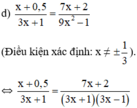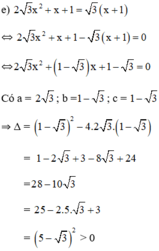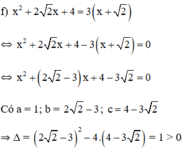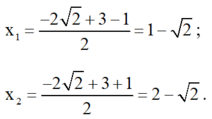Giải phương trình ( Giúp mình với các bạn ! Nhớ trình bày cách giải nữa nha )
1) x4 + 2x3 + x2 + 2x + 1 =0
2) \(x^3 + 1= 2 \sqrt[3]{2x-1}\)
3) \(x^x = 10^{x-x^2}\)
Hãy nhập câu hỏi của bạn vào đây, nếu là tài khoản VIP, bạn sẽ được ưu tiên trả lời.

a)
5 x 2 − 3 x + 1 = 2 x + 11 ⇔ 5 x 2 − 3 x + 1 − 2 x − 11 = 0 ⇔ 5 x 2 − 5 x − 10 = 0
Có a = 5; b = -5; c = -10 ⇒ a - b + c = 0
⇒ Phương trình có hai nghiệm: x 1 = - 1 v à x 2 = - c / a = 2 .
Vậy phương trình có tập nghiệm S = {-1; 2}.

⇔ 6 x 2 − 20 x = 5 ( x + 5 ) ⇔ 6 x 2 − 20 x − 5 x − 25 = 0 ⇔ 6 x 2 − 25 x − 25 = 0
Có a = 6; b = -25; c = -25
⇒ Δ = ( - 25 ) 2 – 4 . 6 . ( - 25 ) = 1225 > 0
⇒ Phương trình có hai nghiệm

Vậy phương trình có tập nghiệm 

⇔ x 2 = 10 − 2 x ⇔ x 2 + 2 x − 10 = 0
Có a = 1; b = 2; c = -10 ⇒ Δ ’ = 1 2 – 1 . ( - 10 ) = 11 > 0
⇒ Phương trình có hai nghiệm

Cả hai nghiệm đều thỏa mãn điều kiện xác định.
Vậy phương trình có tập nghiệm 

⇔ ( x + 0 , 5 ) ⋅ ( 3 x − 1 ) = 7 x + 2 ⇔ 3 x 2 + 1 , 5 x − x − 0 , 5 = 7 x + 2 ⇔ 3 x 2 − 6 , 5 x − 2 , 5 = 0

Vậy phương trình có tập nghiệm 

⇒ Phương trình có hai nghiệm

Vậy phương trình có tập nghiệm 

Phương trình có hai nghiệm:

Vậy phương trình có tập nghiệm ![]()

2:
\(A=\dfrac{x_2-1+x_1-1}{x_1x_2-\left(x_1+x_2\right)+1}\)
\(=\dfrac{3-2}{-7-3+1}=\dfrac{1}{-9}=\dfrac{-1}{9}\)
B=(x1+x2)^2-2x1x2
=3^2-2*(-7)
=9+14=23
C=căn (x1+x2)^2-4x1x2
=căn 3^2-4*(-7)=căn 9+28=căn 27
D=(x1^2+x2^2)^2-2(x1x2)^2
=23^2-2*(-7)^2
=23^2-2*49=431
D=9x1x2+3(x1^2+x2^2)+x1x2
=10x1x2+3*23
=69+10*(-7)=-1

1: \(\Leftrightarrow\left(x-3\right)\left(x+3\right)-\left(x-3\right)\left(5x+2\right)=0\)
\(\Leftrightarrow\left(x-3\right)\left(-4x+1\right)=0\)
hay \(x\in\left\{3;\dfrac{1}{4}\right\}\)
2: \(\Leftrightarrow\left(x-1\right)\left(x^2+x+1\right)-\left(x-1\right)\left(x^2-2x+16\right)=0\)
\(\Leftrightarrow\left(x-1\right)\left(x^2+x+1-x^2+2x-16\right)=0\)
\(\Leftrightarrow\left(x-1\right)\left(3x-15\right)=0\)
hay \(x\in\left\{1;5\right\}\)
3: \(\Leftrightarrow\left(x-1\right)\left(4x^2-1\right)=0\)
\(\Leftrightarrow\left(x-1\right)\left(2x-1\right)\left(2x+1\right)=0\)
hay \(x\in\left\{1;\dfrac{1}{2};-\dfrac{1}{2}\right\}\)
4: \(\Leftrightarrow x^2\left(x+4\right)-9\left(x+4\right)=0\)
\(\Leftrightarrow\left(x+4\right)\left(x-3\right)\left(x+3\right)=0\)
hay \(x\in\left\{-4;3;-3\right\}\)
5: \(\Leftrightarrow\left[{}\begin{matrix}3x+5=x-1\\3x+5=1-x\end{matrix}\right.\Leftrightarrow\left[{}\begin{matrix}2x=-6\\4x=-4\end{matrix}\right.\Leftrightarrow\left[{}\begin{matrix}x=-3\\x=-1\end{matrix}\right.\)
6: \(\Leftrightarrow\left(6x+3\right)^2-\left(2x-10\right)^2=0\)
\(\Leftrightarrow\left(6x+3-2x+10\right)\left(6x+3+2x-10\right)=0\)
\(\Leftrightarrow\left(4x+13\right)\left(8x-7\right)=0\)
hay \(x\in\left\{-\dfrac{13}{4};\dfrac{7}{8}\right\}\)
1.
\(\Leftrightarrow\left(x-3\right)\left(x+3\right)=\left(x-3\right)\left(5x-2\right)\)
\(\Leftrightarrow x+3=5x-2\)
\(\Leftrightarrow4x=5\Leftrightarrow x=\dfrac{5}{4}\)
2.
\(\Leftrightarrow\left(x-1\right)\left(x^2+x+1\right)=\left(x-1\right)\left(x^2-2x+16\right)\)
\(\Leftrightarrow x^2+x+1=x^2-2x+16\)
\(\Leftrightarrow3x=15\Leftrightarrow x=5\)
3.
\(\Leftrightarrow4x^2\left(x-1\right)-\left(x-1\right)=0\)
\(\Leftrightarrow\left(x-1\right)\left(4x^2-1\right)=0\)
\(\Leftrightarrow\left[{}\begin{matrix}x=1\\x=\dfrac{1}{2};x=-\dfrac{1}{2}\end{matrix}\right.\)

\(a,3x-2\left(x-3\right)=0\\ \Leftrightarrow3x-2x+6=0\\ \Leftrightarrow x=-6\\ b,\left(x+1\right)\left(2x-3\right)=\left(2x-1\right)\left(x+5\right)\\ \Leftrightarrow2x^2+2x-3x-3=2x^2-x+10x-5\\ \Leftrightarrow2x^2-x-3=2x^2+9x-5\\ \Leftrightarrow10x-2=0\\ \Leftrightarrow x=\dfrac{1}{5}\\ c,ĐKXĐ:x\ne\pm1\\ \dfrac{2x}{x-1}-\dfrac{x}{x+1}=1\\ \Leftrightarrow\dfrac{2x\left(x+1\right)}{\left(x+1\right)\left(x-1\right)}-\dfrac{x\left(x-1\right)}{\left(x+1\right)\left(x-1\right)}-\dfrac{\left(x+1\right)\left(x-1\right)}{\left(x+1\right)\left(x-1\right)}=0\\ \Leftrightarrow\dfrac{2x^2+2x-x^2+x-x^2+1}{\left(x+1\right)\left(x-1\right)}=0\)
\(\Rightarrow3x+1=0\\ \Leftrightarrow x=-\dfrac{1}{3}\left(tm\right)\)
\(d,\left(2x+3\right)\left(3x-5\right)=0\\ \Leftrightarrow\left[{}\begin{matrix}2x+3=0\\3x-5=0\end{matrix}\right.\\ \Leftrightarrow\left[{}\begin{matrix}x=-\dfrac{3}{2}\\x=\dfrac{5}{3}\end{matrix}\right.\\ e,ĐKXĐ:x\ne\pm2\\ \dfrac{x-2}{x+2}-\dfrac{3}{x-2}=\dfrac{2\left(x-11\right)}{x^2-4}\\ \Leftrightarrow\dfrac{\left(x-2\right)^2}{\left(x-2\right)\left(x+2\right)}-\dfrac{3\left(x+2\right)}{\left(x-2\right)\left(x+2\right)}-\dfrac{2x-22}{\left(x-2\right)\left(x+2\right)}=0\)
\(\Leftrightarrow\dfrac{x^2-4x+4-3x-6-2x+22}{\left(x-2\right)\left(x+2\right)}=0\\ \Rightarrow x^2-9x+20=0\\ \Leftrightarrow\left(x^2-5x\right)-\left(4x-20\right)=0\\ \Leftrightarrow x\left(x-5\right)-4\left(x-5\right)=0\\ \Leftrightarrow\left(x-4\right)\left(x-5\right)\\ \Leftrightarrow\left[{}\begin{matrix}x=4\left(tm\right)\\x=5\left(tm\right)\end{matrix}\right.\)
Thực ra 2 câu đầu rất dễ nha bạn ^^!
1) x4 + 2x3 + x2 + 2x + 1 =0 <=> x3(x+2)+x(x+2)+1 = 0
<=> (x3+x)(x+2) + 1=0
1>0
=> (x3+x)(x+2) + 1=0 <=> (x3+x)(x+2) = 0
<=>\(\orbr{\begin{cases}^{x^3+x=0}\\x+2=0\end{cases}}\)<=>\(\orbr{\begin{cases}^{x\left(x^2+1\right)=0}\\x=-2\end{cases}}\) <=>
 \(\orbr{\begin{cases}^{x=0}\\x=-2\end{cases}}\)
\(\orbr{\begin{cases}^{x=0}\\x=-2\end{cases}}\)
b)
x3+1=\(2\sqrt[3]{2x-1}\)
<=> x^3 - 1 = 2(\(\sqrt[3]{2x-1}\) -1)
<=> (x-1)(x2+x+1) = \(\frac{4\left(x-1\right)}{\sqrt[3]{\left(2x-1\right)^2}+\sqrt[3]{2x-1}+1}\)
<=> (x-1)[(x2+x+1) - \(\frac{1}{\sqrt[3]{\left(2x-1\right)^2}+\sqrt[3]{2x-1}+1}\) ] =0
<=> x=1
xin lỗi bạn mình ghi nhầm câu 1, mai mình sẽ sửa lại